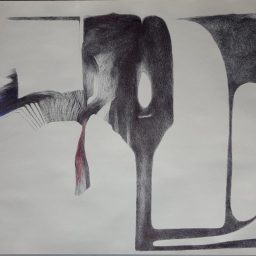Hadeel Azeez is a visual artist lives and works in Rome, Italy, born in Baghdad, Iraq. After attending the Academy of Fine Arts in Baghdad, specializing in painting, she moved to Italy in 2003, shortly before the outbreak of the war in Iraq.
This period is marked by an embryonic phase of study and experimentation when Azeez mainly focuses on portraits and takes part in several group exhibitions. Her main exhibition activities include: 2011 is the year of Infini Dettagli (Bari, Galleria FormaquaIro) exhibition that introduces the first installations and new iconographies on canvas: enlarged anatomical details, accompanied by verses by Arab poets. In May of the same year the solo exhibition Rivelazioni In Blu (Revelations in blue) took place at the Contemporary Gallery in Rome.
The same year an intense exhibition activity sees the artist engaged in three installations in Sicily: Solitudine dai lunghi riflessi (Solitude with long reflections) at the new ethno-anthropological Museum of Solarino and at the Exhibition Palace of the Province of Syracuse, in which she presents her first video-art and works with music and dance performances, and Identità Preservate at the Galleria dello Steri, once again in Syracuse.
Also in 2011, in Naples, the solo exhibition Transiti at the Suor Orsola Benincasa University (which houses the work entitled La luna) and the group exhibition in Castel dell’Ovo, Le Ceneri Della Fenice.
In May 2013, Sensi took place at the Iraqi Embassy in Rome, this an exhibiton hosts an important body of works from the last five years, among which an artwork titeled A Greeting To The Motherland, owned by the embassy itself.
In 2014 at the MAAM a site-specific work titled Fuggiasco dalla mia casa alla mia casa (a fugitive from my home to my home): created on a large sliding door, which refers to the ricerch for the true inner self. Between 2013 and 2018 she participated in various exhibitions in the Italian capital, including La mente artistica, at the Teatro dei Dioscuri al Quirinale.
These are years of encounters, passionate research, in which Azeez's style changes, evolves, giving birth to a new language made of infinite sinuous strands, mainly made with the black ink of the ballpoint pen, which generate shapeless masses of an extraordinary expressive power. A style that dominates the 2018 solo exhibition Storia di una liberazione (history of a liberation) at the Horti Lamiani Bettivò contemporary art gallery and in 2019 the group exhibition, Intrecci d’arte, shown at the Gallery of Temple University Rome. The same year at the Macro museum of contemporary art in Rome during the project Macro Asilo - she exhibited several works in the atelier room 2.
She also takes part in experimental projects such as the Matriarchivio del Mediterraneo, Grafie e Materie (M.A.M), a digital planorm aimed at preserving the memory of emerging artists operating in the Mediterranean area, and the theater performance Feminae forme elette (Rome, Sala Umberto, in 2018; Bologna, Teatro Duse, in 2019): a tribute to the creative power of women, for which she creates artworks on the stage.
In December 2021 Azeez recounts her story and art in the collective project Moving On, produced and created by Eefje Ludwig, together with the MAPS team, for the National Geographic Society.
In May 2022, the personal exhibition curated by the Orestiadi foundation of Gibellina titled Le Figure Segrete Dietro Ogni Parola - The secret figures behind every word - was held at Palazzo Sant'Elia in Palermo, Sicily. In October of the same year the exhibition entered the Orestiadi foundation private collection to be exhibited at the Museum of the Mediterranean Trame.
In December 2022 Hadeel Azeez received the Franco Cuomo International Award.
In June 2023 the solo exhibition WATER took place at Capitoliumart - Spazio all'Arte in Rome. 11 unedited works including three works destined to become a moving image video installation entitled The Three Waves and Gratitude an artwork with a rotation mechanism.
The art critic Prof. Marco Meneguzzo in his text Being Fluid, published on WATER exhibition's catalog, describes Hadeel Azeez's work: [...] Hadeel Azeez, too, is part of this “rediscovery”, despite being a young artist. She could be considered the extreme offshoot of a long linguistic journey that has introduced this discourse on writing and that finds again at the closing of the circle, in her cultural roots, as the starting point and at the same time the arrival point of “her own” globalization.
Events at Rome Art Week
2024
Event by invitation only
Vernissage Friday 04 Oct 2024 | 17:00-21:00
Free access
2023
Free access
Vernissage Monday 23 Oct 2023 | 17:00-19:30





